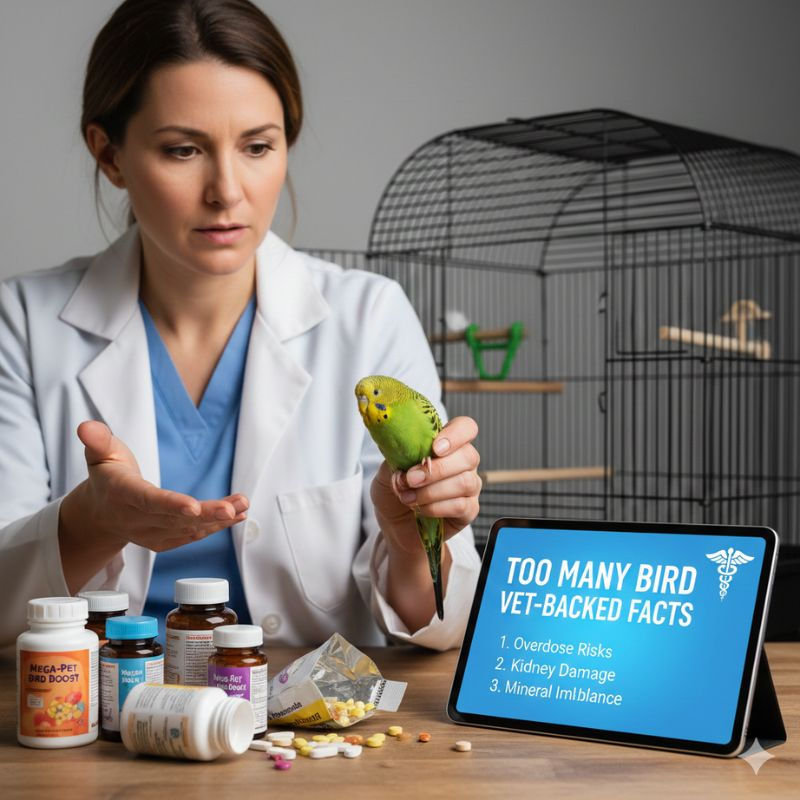Birds Food Secrets: What Vets Wish Every Bird Owner Knew
- petperchlove
- Apr 17, 2025
- 3 min read

When it comes to taking care of our feathered companions, diet plays a crucial role in their health and happiness. However, many bird owners unknowingly make nutritional mistakes that can impact their pet's quality of life. Understanding the ins and outs of birds food isn’t just helpful—it’s essential.
Veterinarians who specialize in avian care often witness the long-term effects of poor dietary choices. In this guide, we’re uncovering the top bird food secrets that vets wish every bird owner knew.
Why the Right Birds Food Matters More Than You Think
Birds, like humans, thrive on balanced nutrition. Unlike cats and dogs, birds have highly specific dietary needs that vary by species. The wrong pet bird food can lead to a range of health problems—from obesity and feather plucking to vitamin deficiencies and even early death.
Veterinarians stress that bird owners must move beyond seed-only diets. While seeds are a part of many birds’ natural intake, they’re often too high in fat and too low in essential nutrients for long-term health.
What Should a Healthy Bird Food Diet Include?
1. Pellets (The Foundation of Pet Bird Food)
High-quality pellets should make up at least 60-70% of your bird’s diet. These are scientifically formulated to meet a bird’s nutritional needs, including vital vitamins and minerals.
2. Fresh Fruits and Vegetables
Birds benefit greatly from produce like:
Leafy greens (spinach, kale)
Carrots, sweet potatoes
Apples, bananas, berries (avoid seeds and pits)
3. Whole Grains & Legumes
Brown rice, cooked quinoa, oats, and lentils are excellent additions that offer fiber and slow-digesting energy.
4. Seeds and Nuts (In Moderation)
These are ideal as treats, training rewards, or to stimulate natural foraging behaviors. Use them sparingly to avoid excess fat intake.
Common Birds Food Myths—Debunked
“Seeds are all a bird needs.”
Wrong. A seed-only diet lacks calcium, vitamin A, and other key nutrients. Over time, this leads to malnutrition.
“Human food is okay in small amounts.”
While some fruits and vegetables are safe, salty snacks, chocolate, caffeine, and avocado are toxic to birds.
“Birds know what’s good for them.”
Unfortunately, birds often prefer high-fat foods like sunflower seeds. Just because they eat it doesn’t mean it’s good for them.
Vet-Approved Tips for Better Birds Food Habits
Rotate Fresh Ingredients: Offering a variety of safe fruits and vegetables helps mimic a wild diet and prevents boredom.
Use Foraging Toys: These encourage natural behaviors while making feeding more enriching.
Watch for Spoilage: Remove uneaten fresh food after a couple of hours to prevent mold and bacteria.
Weigh Your Bird Weekly: Weight loss or gain can be early signs of nutritional imbalance.
Understanding Your Bird’s Species-Specific Needs
Different bird species have different dietary requirements. For example:
Parakeets and Cockatiels do well on pellets, with some seeds and greens.
African Greys need extra calcium and vitamin A.
Lories and Lorikeets require a liquid nectar-based diet.
Always consult an avian vet for tailored advice.
How to Choose the Best Pet Bird Food
When shopping for birds food, look for:
No artificial colors or flavors
Clear labeling of ingredients
Veterinarian-recommended brands
Balanced nutrient profiles
Stick to brands with transparent manufacturing practices and customer trust.
Sample Weekly Feeding Schedule (Small Parrot Example)
Day | Pellets | Fresh Foods | Seeds/Treats |
Monday | ✔ | Kale, apple slices | Almond sliver |
Tuesday | ✔ | Carrots, blueberries | Millet spray |
Wednesday | ✔ | Spinach, banana slice | Sunflower seeds (few) |
Thursday | ✔ | Sweet potato, pear | Oat groat mix |
Friday | ✔ | Zucchini, mango | Pumpkin seed |
Saturday | ✔ | Romaine, grapes | Foraging mix |
Sunday | ✔ | Broccoli, melon | Nutri-berries |
Final Thoughts
Proper birds food is the cornerstone of a happy, healthy avian life. As bird lovers, it’s our responsibility to ensure our pets get the nutrients they need to thrive—not just survive. By understanding vet-backed nutritional guidance, investing in the right bird food, and staying informed, we can give our birds the quality of life they deserve.
FAQs
Q1. Can I feed my bird the same food every day?
A: No. Birds benefit from variety to ensure they’re receiving a balanced range of nutrients. Rotating safe fruits, veggies, and treats keeps their diet exciting and healthy.
Q2. How do I transition my bird from seeds to pellets?
A: Gradually mix pellets into their current food, slowly increasing the amount over 2–3 weeks. Encourage acceptance by offering them during peak hunger times and using foraging toys.
Q3. Are all pet bird foods the same?
A: Definitely not. Quality varies significantly between brands. Look for products with clean, natural ingredients and vet endorsements.
Q4. What foods are toxic to birds?
A: Avocado, chocolate, caffeine, alcohol, onions, garlic, and salty snacks are all dangerous. Always double-check before introducing new foods.
Q5. How often should I give fresh food to my bird?
A: Daily. Remove any uneaten portions after 1–2 hours to avoid bacterial growth.



Comments